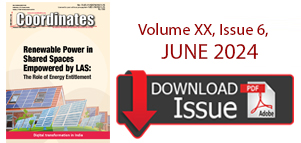GNSS
Galileo Second Generation proof-of-concept testing begins
The first Galileo Second Generation hardware has begun testing, with test versions of the satellites’ navigation payloads undergoing evaluation by Airbus Defence and Space at their Ottobrunn facility in Germany and by Thales Alenia Space at ESA’s ESTEC technical centre in the Netherlands.
These testbed versions of these new navigation payloads designed by the two companies are undergoing testing of their respective navigation antennas to check whether they meet the ambitious performance levels set for the coming generation of Europe’s satellite navigation system. www.esa.int
New tool limits disruptions caused by Space operations: FAA
The Federal Aviation Administration (FAA), USA said it has got a new tool — Space Data Integrator — which will help them track rocket launches and Space vehicles returning to Earth in a better way. The tool will replace a system in which much of the work of giving telemetry data about Space vehicles to air traffic control managers is done manually.
According to the FAA, Elon Musk’s SpaceX was the first company to share flight telemetry data with the FAA, and others, including Jeff Bezos’s Blue Origin, have also joined the program.
The FAA said the new technology was first used on June 30 for the launch of SpaceX’s Transporter 2, which lifted off from Cape Canaveral, Florida, carrying dozens of satellites into orbit. It will be used again with the pending return of a SpaceX cargo ship from the International Space Station.
During Space operations, the FAA shuts a huge section of airspace for hours in case the rocket or the Space vehicle breaks apart. Airlines must reroute flights, which causes them to burn more fuel and fall behind schedule. A single launch can affect hundreds of flights. www.faa.gov
Inhofe, Duckworth, Rounds introduce RETAIN GPS Act
U.S. Sens. Jim Inhofe (R-Okla.), ranking member of the Senate Armed Services Committee, Tammy Duckworth (D-Ill.) and Mike Rounds (R-S.D.) introduced S. 2166, the Recognizing and Ensuring Taxpayer Access to Infrastructure Necessary for GPS and Satellite Communications Act or RETAIN GPS and Satellite Communications Act. The April 2020 Ligado Order from the FCC recognized the likelihood of interference to GPS signals and requires Ligado to pay the federal government the costs for repairs. However, 99 percent of the more than 900 million GPS devices found in the United States are used by the private sector, consumers, as well as state and local governments; under the current Order, they—or their consumers—would have to bear the costs.
“GPS and satellite communications don’t only impact our military—we rely on it for so much of our day to day lives, which is why we need to take steps to protect not just the federal government from the harmful decision, but all state and local governments, private entities and consumers too,” Inhofe said. “Our nation has an integrated public and private sector infrastructure to support the reliability and use of GPS and satellite communications to navigate our cars and boats for recreation and commerce, to plow our fields, to manage equipment for transportation construction projects, to track our exercise and to predict weather patterns – the list goes on. When Ligado’s effort to repurpose spectrum causes interference in the infrastructure of those systems, as tests have shown it will, consumers and taxpayers shouldn’t bear the burden of updating countless systems. That cost should only be borne by the responsible party: Ligado.”
“As a founding co-chair of the Congressional GPS Caucus, I’m proud to help Senator Inhofe introduce bipartisan legislation that will help make sure Ligado Networks is accountable for covering the costs of addressing any harmful interference that results from deployment of its proposed wireless network,” said Duckworth. “Given the continued concerns regarding Ligado’s efforts from stakeholders like the Department of Defense, Department of Transportation, NTIA and countless industries that rely on GPS and satellite communications, Congress should establish clear pre-conditions that Ligado must meet before the FCC Order may go into effect.” www.inhofe.senate.gov
Ligado Networks statement on the RETAIN GPS Act
Ligado Networks issued the following statement from Chief Communications Officer and Head of Congressional Affairs Ashley Durmer regarding the RETAIN GPS Act:
“This legislation is unnecessary, as the FCC’s bipartisan, unanimous, and science-backed order fully protects GPS devices – whether they’re used by the government or the private sector – as well as satellite communications devices. This bill does not address any safety issues; instead, it presents a false notion that consumers are at risk – when the FCC determined they are not – and then requires one company to assume a cost burden that is not based on actual harm.
Years of data, testing and congressional testimony make it clear that – just like government GPS users – consumer devices like smartphones and safety-of-life equipment, like certified aviation receivers, are not at risk from Ligado operations. To suggest otherwise implies that technical experts and career public servants at the FCC would knowingly put Americans in harm’s way. That is not only false, but also illustrates a lack of seriousness on this topic.
We stand ready to work in good faith to implement the FCC’s order and are moving full-steam ahead on the important work of developing and deploying 5G services that will keep the U.S. globally competitive and help modernize the critical infrastructure companies that keep America running.” https://ligado.com
|












 (No Ratings Yet)
(No Ratings Yet)




Leave your response!